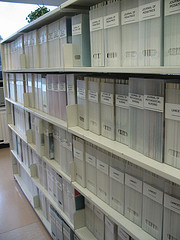by Frances Bell, CC3.0 Unported
Henry Jenkins by Tamaleaver CC by 2.0

Journals on Shelves by Bezanson CC by 2.0
I am going to throw out a few initial ideas about comparing academic journals and blogs as publication channels, as a kick off to a writing project I’ll be doing with Cristina Costa.
Let me start by saying that it is very difficult to generalise about either academic journals or blogs as channels since they are each in a state of flux, changing and interpreted differently by different users and audiences. This post has been provoked by recent discussion on peer review and journals within my (albeit limited) network. The issues that interest me are:
- development of research and writing
- the role of peer review and editing
- dissemination of research
Obviously, I will be collaborating with Cristina and we will both improving our review of the literature to find what is already known on the subject.
development of research and writing
Blogs can play a role in the development of academic writing. An author can try out ideas and get feedback. I have tried this myself (but can’t point to the posts as they are sadly lost) on a paper I wrote for Networked Learning 2010. Also I recall a learning developer who posted successive drafts of an essay on their blog in response to readers’ feedback (would love the link to this if anyone has it). I think the intention of this was to reveal the sometimes messy journey of writing rather than to recommend this as a method of writing.
I see writing as a process with a product that emerges from privacy to publication with more eyes seeing and commenting along the way. A tweet may take only a minute to write but increasingly this text is wraparound/trigger to click a link to another text /multimedia artifact such as a blog post or video created over a much longer period.
There are different styles of blogging and plenty of tips on how to do it and writing for different audiences is very useful for an author’s toolkit.
Writing an article for a scholarly journal is likely to be a much more lengthy process with commenting and revisions emerging from the exchanges between authors, reviewers and editor(s) not all which are ‘public’ in the sense the article itself is. The process for rejected articles is private with no publication endpoint. Journals with a commitment to the development of their authors will try to ensure that peer review is as much about development as about selection/ rejection. I am interested in the role that blogging and other social media can play in writing development.
the role of peer review and editing
Journal peer review can be double blind (where neither reviewer nor authors are known to each other – though it is sometimes possible for them to guess each others’ identities); single blind where the reviewers know the authors’ identities but they remain anonymous to authors. Usually peer review remains a relatively private exchange with comments and responses sent by email. Different levels and types of openness are possible. JIME, Journal of Interactive Media Education conducted very interesting dialogic review and I am interested to research into evaluations of that and similar approaches. I do know that reviewing can help writers develop, and that editing has had an impact on my reviewing and my writing.
I was also interested in Alan Cann’s experiment with open review but think that much more work needs to be done to tease out more and less effective methods of using feedback to develop writing. I am not at all convinced by Doug Belshaw’s linkage of transparency to better in relation to peer review (see last sentence).


